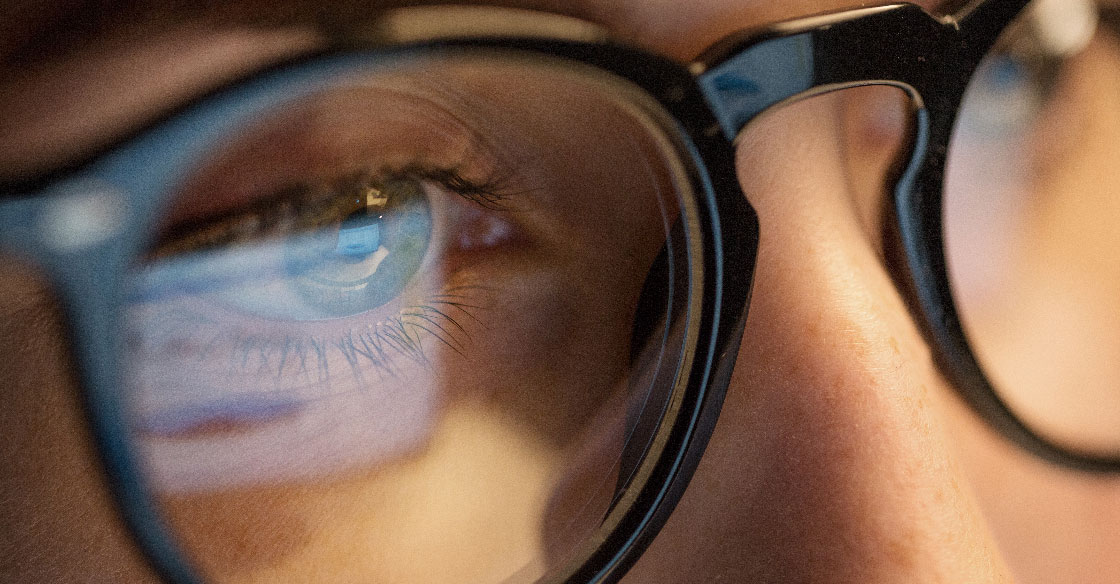Myths About How Your Daily Activities Effect Your Eye Health

When it comes to advice about maintaining eye health, it can be hard to differentiate between facts and fiction. Below, we clear up a few misconceptions about how your daily activities might be influencing your vision.
Myth #1: Staring at your computer will cause vision problems.
We’ve all heard it: “don’t stare at your computer screen for too long—you’ll wreck your vision!” But is there really evidence for this? Experts say no. While staring at a bright screen for prolonged periods of time may cause watery eyes (especially if you are focusing, which can cause you to blink less often), there’s no evidence suggesting that any long-term vision damage occurs from computer use. You should take regular breaks, however, to avoid mild eye strain and the resulting discomfort. If this occurs, it’s usually not serious and will fade with rest within 24 hours.
Myth #2: Reading in dim light will damage your eyes.
Contrary to popular thought, reading in dim-lit settings will not worsen your vision. Your eyes are highly adaptable and are good at adjusting to various settings. It’s possible that routinely reading without enough light can cause short-term eye fatigue or watery eyes, but it will not cause long-term damage.
Myth #3: Using glasses or contacts will make your vision worse
If you are a current glasses or contacts wearer, don’t worry! Glasses or contact prescriptions that correct nearsightedness, farsightedness, or astigmatism do not weaken your eyes over time or cause any of these issues to become more pronounced. Corrective lenses are simply eternal supportive devices that compensate for refractive errors. If anything, wearing glasses or contacts prevents you from having to strain your eye to see (which can cause short-term eye muscle fatigue). There are a couple of exceptions to this rule, however; glasses prescribed to children who have crossed eyes (strabismus) or a lazy eye (amblyopia) can help alleviate these conditions if worn regularly. If you don’t currently have a prescription but have asked yourself recently “Do I need glasses?” don’t hesitate to make an appointment with your optometrist to evaluate your vision!
Myth #4: There’s nothing you can do to prevent vision loss
While staring at a computer or wearing glasses won’t worsen your vision, there are a number of “best practices” you should employ to keep your eyes healthy. You should protect your eyes from the sun by wearing sunglasses when outdoors and refraining from looking directly at the sun, which can lead to partial or complete blindness. If you wear contact lenses, you should make sure to clean them properly and thoroughly before and after each wear to prevent infection and corneal ulcers. You should also practice general healthy habits—including eating a well-balanced, healthy diet rich in fruits and vegetables, and incorporating regular exercise into your routine—to help prevent diabetes, which can cause diabetic retinopathy (a leading cause of vision loss among working-age adults).
Myth #5: You don’t need regular eye exams if you don’t have any obvious vision problems.
Some eye conditions are not immediately obvious and simply cannot be detected without the help of a professional. Whether or not you have a prescription, you should visit your optometrist regularly (at least once a year) to promote long-term eye health!
Eyelux Optometry
Eyelux is a San Diego-based Optometrists Office that specializes in comprehensive eye exams and special clinics. We work seamlessly with many insurance companies. If you or a loved one is in need of optometrist services, don’t hesitate to contact us.

